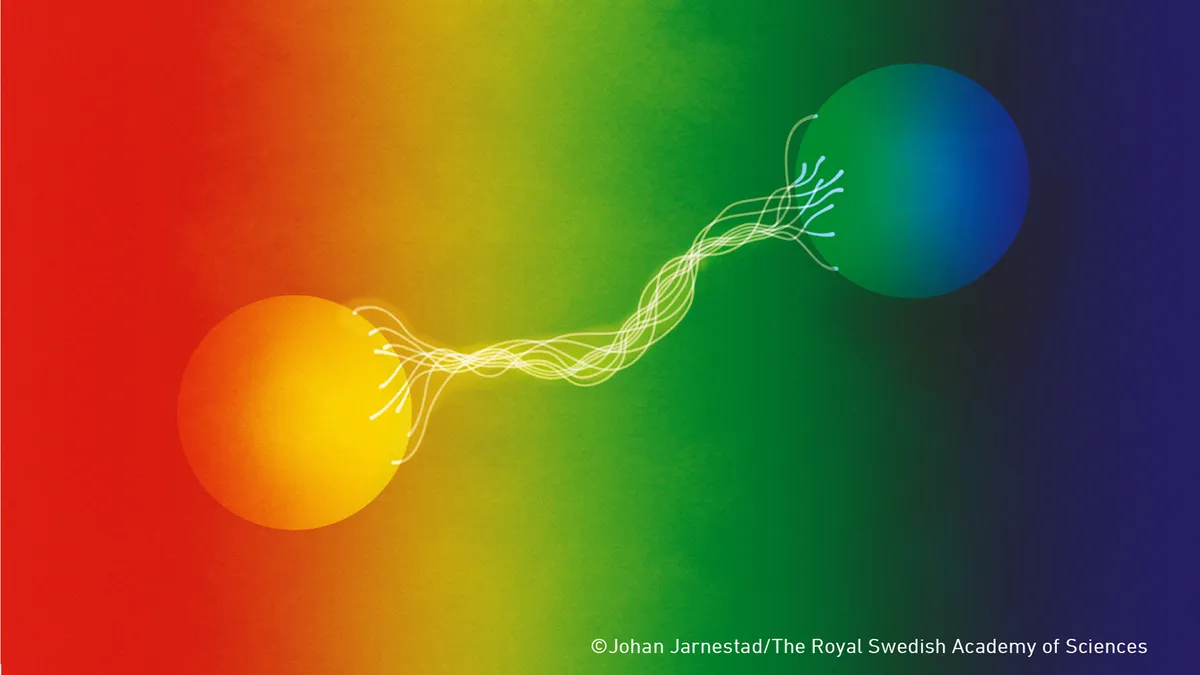The understanding of entangled photons has led to a plethora of practical applications, including quantum cryptography.
Three scientists who laid the groundwork for the understanding of the odd "entangling" behavior of quantum particles have received the 2022 Nobel Prize in Physics.
French physicist Alain Aspect, Austria's Anton Zeilinger and American John Clauser were honored for their experiments exploring the nature of entangled quantum particles.
Defying the logic of our everyday reality, such particles behave like a single unit even when they are far away from each other. Engineers are currently working on harnessing this odd behavior in a range of revolutionary technologies, including quantum computing and quantum cryptography, a supposedly unbreakable technique of secure information coding.
The beginning of quantum theory dates back to the great physicists of the early 20th century, including Albert Einstein and Niels Bohr. But the generation represented by the three new Nobel Prize laureates bridged the gap between theory and practical experiments and applications.
"Quantum information science is a vibrant and rapidly developing field. It has a broad range of potential implications in areas such as secure information transfer, quantum computing and sensing technology," Eva Olsson, a member of the Nobel Committee for Physics, said in a news conference on Tuesday(Oct.4). "This year's Nobel Prize in Physics honors the groundbreaking work and science of the central figures who took up the challenges and tackled them in laboratories."
One of the most mature applications of quantum technology is quantum cryptography, which takes advantage of the fact that changes made to one particle in an entangled system affect the other. Encryption keys to secret messages can therefore be encoded into the quantum states of such particles. These keys can be exchanged between the parties in the communication process securely, because any interception of the secret keys by a third party would inherently change the particles' quantum state and render the keys invalid.
Quantum key distribution via satellites was first demonstrated by China in 2016 as part of its Quantum Experiments at Space Scale project. Countries all over the world have since begun developing similar technologies.
Perhaps the most high-profile application of entangled quantum particles is in the nascent field of quantum computing. Quantum computers encode information into the quantum states of particles, which can lead to giant leaps in the speed of information processing.
Scientists believe that, once up and running, quantum computers will accelerate drug research, material science and lead to improvements in climate change modeling and weather forecasting, among other benefits.
"It has become increasingly clear that a new kind of quantum technology is emerging," Anders Irbäck, chair of the Nobel Committee for Physics, said in a statement. "We can see that the laureates' work with entangled states is of great importance, even beyond the fundamental questions about the interpretation of quantum mechanics."
"This prize demonstrates the fundamental beauty of physics," Penelope Lewis, the chief publishing officer of the American Institute of Physics' publishing department, commented in a statement. "With their pioneering experiments in quantum entanglement, Aspect, Clauser, and Zeilinger brought quantum mechanics out of its philosophical beginnings — dating back nearly a century — and into the present day. Their experiments laid the groundwork for incredible advances in quantum computing and cryptography, technologies with the potential to transform the modern world."
- Karlston
-

 1
1




Recommended Comments
There are no comments to display.
Join the conversation
You can post now and register later. If you have an account, sign in now to post with your account.
Note: Your post will require moderator approval before it will be visible.